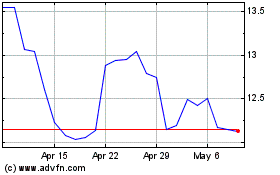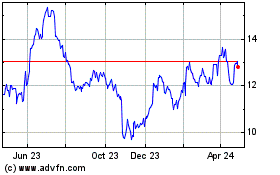By Anne Steele And Jeff Bennett
Automobiles flew off dealer lots last month at the fastest pace
in 10 years, but the good times are stirring tension between U.S.
auto makers and their unionized workers that threatens to undercut
the industry's rebound.
United Auto Workers union members at Fiat Chrysler Automobiles
NV this week rejected for the first time in three decades a
tentative agreement as inadequate, and Ford Motor Co. faces a
walkout at a big truck factory as soon as Sunday.
As buyers flood dealer lots, snapping up pricey pickups and
sport-utility vehicles that deliver fat profits to General Motors
Co., Ford and Fiat Chrysler, factory workers are demanding an end
to the concessions that put the U.S. industry back on its feet
after near collapse seven years ago.
"We got a catered meal of hot dogs and hamburgers as our thanks
while others, I'm sure, got big bonuses," said Phil Reiter, a
44-year-old union member referring to a recent production milestone
at Fiat Chrysler's Toledo, Ohio, Jeep factory. That plant on
Tuesday rejected a UAW supported contract by a more than 4-to-1
ratio.
The workers are angry that neither union officials nor Fiat
Chrysler want to eliminate a concession put in place just ahead of
the 2008 recession that pays some assembly-line staff substantially
less than co-workers doing the same work. The same two-tier system
exists to a lesser extent at GM and Ford.
Surging sales aren't helping the relationship. U.S. car and
light-truck sales rose nearly 16% last month compared with the same
period a year ago, an annualized pace of 18.17 million vehicles. It
was only the ninth time in history the monthly pace eclipsed 18
million, and the first time since 2005.
On Thursday, the UAW confirmed that 65% of its Fiat Chrysler
members spurned Fiat Chrysler's offer, the first time in more than
30 years a proposed bargaining deal was voted down. The decision is
a blow to the UAW, which has tried to reverse a persistent decline
in union auto jobs by accepting concessions.
In mid-September, UAW President Dennis Williams said the
now-rejected pact addressed worker concerns while keeping Fiat
Chrysler competitive. He huddled with union leaders on Thursday to
determine his next move. Mr. Williams had wanted to move on to
negotiate new contracts with GM and Ford that likely would follow
terms of the rejected Fiat Chrysler deal.
Fiat Chrysler said on Thursday that it was opposed to returning
to prerecession wage terms. "The cyclical nature of the automotive
business demands that while we must recognize the need for
rewarding employees during times of prosperity, we must also
protect against the inevitable market downturn," Fiat Chrysler
said. It referenced its "near-death experience" in 2009, and
committed to never letting those days repeat.
The Italian-American auto maker has grown faster than its U.S.
rivals. September marked the 66th consecutive month of
year-over-year growth as Jeep and Ram pickups remain among the most
popular in the industry. It had offered a raise for workers and
richer bonuses, but also said some production will be moved to
Mexico.
Mark Wakefield, managing director at consultants AlixPartners
LLC, said auto makers must recognize the backdrop against which
they are negotiating. Employment has recovered since the financial
crisis, and a tightening job market is forcing car makers to
scramble to find enough skilled workers to operate factories.
"Workers are not just feeling good because their company is
doing well, there are more employment options out there," he said.
Unemployment in Detroit's metro area touched a 15-year low last
month, and the area's joblessness rate is declining at twice the
pace of the country as a whole, according to newly-released Labor
Department statistics.
Detroit is only one of the auto industry's hot pockets. In
Missouri, where GM and Ford build sedans and pickups, workers are
threatening a walkout this weekend. That would hamper Ford's
ability to meet demand for its new aluminum pickup truck, which is
driving the auto maker to some of the highest profit levels in its
history.
The bankruptcies and deep restructuring of last decade allow
domestic auto makers to run a much more disciplined strategy even
as the industry is on pace to reach its highest volume since 2000.
With less production capacity and fewer dealers, Detroit companies
are limiting inventories and that makes them less likely than they
used to be to offer hefty incentives.
Although Labor Day weekend deals and low interest rates played a
role in boosting demand, this momentum isn't being prompted by the
extraordinary amount of sales-incentive spending that fueled booms
of the past and eroded profit margins.
For instance, the industry's sales pace topped 20 million in
consecutive Julys in the mid-1980s, but that came during a fierce
price war waged by Detroit auto makers looking to hold off import
brand gains. GM triggered another boom in 2001 after the 9/11
terrorist attacks with its "Keep America Rolling" campaign; in 2005
it extended employee discounts for the entire market, again
prompting volumes to near-record levels.
"This is a very different [job] market," said AlixPartners' Mr.
Wakefield, who worked with the Obama administration on the 2009
bankruptcies of GM and Chrysler. Although he sees the market
peaking in the midterm, he said Detroit is better prepared to deal
with volume declines.
The No. 3 U.S. auto maker, Fiat Chrysler, reported a 13.6%
September increase, GM logged a 12.5% gain, and Ford's volumes grew
23.3%, all compared with year-earlier sales.
Foreign auto makers also delivered double-digit percentage sales
gains last month. Toyota Motor Corp. said its sales jumped 16.2%.
Bill Fay, general manager of the Toyota brand, said the company is
confident demand will hold in the fourth quarter, and said in some
areas demand for certain vehicles is outstripping supply.
Volkswagen AG's sales rose less than 1% last month, similar to
its recent performance. The Environmental Protection Agency accused
the German auto maker on Sept. 18 of using software to sidestep
emissions testing on its diesel-powered vehicles. Volkswagen
apologized and has vowed to fix the cars.
Write to Jeff Bennett at jeff.bennett@wsj.com
Subscribe to WSJ: http://online.wsj.com?mod=djnwires
(END) Dow Jones Newswires
October 01, 2015 19:57 ET (23:57 GMT)
Copyright (c) 2015 Dow Jones & Company, Inc.
Ford Motor (NYSE:F)
Historical Stock Chart
From Mar 2024 to Apr 2024

Ford Motor (NYSE:F)
Historical Stock Chart
From Apr 2023 to Apr 2024
